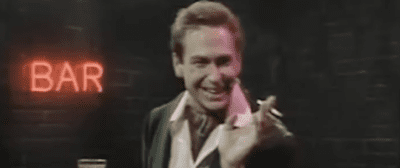Still from 'Starfucker,' courtesy Sundance Institute
Meet 6 Brooklynites who had a great Sundance before they really blow up
Interviews with actors and filmmakers from the borough who you’ll want to keep an eye on going forward
Brooklyn actors and directors were out in full force at this year’s virtual edition of the Sundance Film Festival. We watched 30 movies so you didn’t have to (although you certainly should have), and it should come as no surprise the best movies were short films by artists in our community.
Sundance agreed: “Stranger Than Rotterdam with Sara Driver” received the Short Film Special Jury Award for Screenwriting. We interviewed the short’s directors, Bushwick brothers Lewie and Noah Kloster.
We also spoke with filmmaker James Gannon, director of “Deerwoods Deathtrap,” a documentary about Gannon’s parents’ brush with death when a train hit their car. Directors Anne Alvergue and Debra McClutchy of Netflix’s “The Martha Mitchell Effect” tell us about surfacing the forgotten story of Martha Mitchell, Republican socialite who brought down the Nixon White House. And actor Cole Doman tells us about the use of drag in his short “Starfuckers” for revenge and healing from Hollywood-inflicted trauma.
Be on the lookout for these shorts as they find their way to screens throughout 2022, and keep tabs on these filmmakers because they’re about to break out.
Stranger Than Rotterdam with Sara Driver
Directors: Lewie and Noah Kloster
The story: Jim Jarmusch needed money to finish his second film,1984’s “Stranger Than Paradise.” Huub Bals, director of the Rotterdam Film Festival, thought Jim and his producer Sara Driver could secure funding at his film market, but he could only afford for Jim to fly. To justify the cost of a second ticket, Driver had to smuggle one of the world’s rarest and most controversial films across the Atlantic for Bals: “Cocksucker Blues,” the 1972 Rolling Stones U.S. Tour film that captured the band’s debauchery. Lewis and Noah Kloster tell Driver’s story in “Stranger Than Rotterdam with Sara Driver” using handmade puppets and her narration.
Your puppets are so dynamic and important the story in a way that, say, the Muppets aren’t really.
Lewie Kloster: There was something about the puppets that worked when we made them. We thought we were going to make 3D puppets but to save time we made them 2D because our brains are so stupid.
Noah Kloster: We used the only Hollywood trick of forced perspective but we did it on a miniature scale. Because we used miniatures it’s easier to control the environment. We also moved the backgrounds slower and the foreground faster because that’s truer to how we experience motion.
You’ve made a lot of animated movies at this point. Why is animation your style of choice?
Lewie: Everything we do isn’t because we like animating, it’s that we like storytelling and we’re very specific about what we want to see, and we’re broke. So what does that all add up to? We can make what we want if we do it at 1:20 scale.
Noah: Someday it would be awesome to do a Christopher Nolan type film if we have the money.
Lewie: We love animating, and we’re probably going to do it for the next 20 years, but it doesn’t stop there for us.
Tell me about your studio in Brooklyn.
Lewie: It depends on who we’re talking to. We really work out of our kitchen in Bushwick. There’s about 30 feet of space where we work. It started with one table but now we have three, I don’t know how that happened. But we’re moving to a studio soon.
How did your collaboration with Sara Driver come together?
Lewie: We met her at a young artist’s class at Film at Lincoln Center and she was the coolest and when she was done talking she asked for Lewie Kloster. She saw we made the short “Legal Smuggling with Christine Choy” and she’s friends with Choy, so she asked, “How the hell is she?”
Noah: After she watched our short we asked if we could make a movie with her, and she told us she has a smuggling story, but the meaning behind the story is more dense than just smuggling something in the airport.
Lewie: Sara wrote a script and over a year we met five times to punch up the story to make it more dramatic. She’s really important to Jim Jarmusch’s career but it’s tough to have someone say that about themselves. After six recording sessions we had a workable script with enough dramatic tension and stories to keep audiences interested.
Starfuckers
Actor: Cole Doman
The story: Brooklyn actor Cole Doman’s new short film “Starfuckers” is about twinks out for revenge on a Hollywood executive. Set in a Hollywood estate, Doman’s character acts out a sexual fantasty for the exec while actor/director Antonio Marziale’s character sneaks in. The two drug him, and when he wakes up, they perform a ritual act of revenge that restores their dignity.
Your and Antonio Marziale play characters out for revenge, but what you do to get revenge is unexpected to say the least.
Cole Doman: It was important to us to stay away from violence. The real revenge was getting to show our ability and our stardom, and for Toni’s character to really give the performance of a lifetime; that he doesn’t need the affirmation of a Hollywood abuser to tell him he’s a star.
Is the story based on either of your experiences in the entertainment industry?
Not directly, but, as a young actor I’ve had my fair share of older men in this industry who see something new and shiny and either want to destroy it or take it or claim it. There’s always been a balance in my worklife of knowing someone’s genuine interest in me and my talent opposed to someone interested in me in a different way. As a gay man that’s taken practice, and when you’re younger you fall for it more. I haven’t experienced anything to the degree at which we show in “Starfuckers.”
Why did you make a movie about sexual predators in entertainment?
You hear all these stories about high-level executives who are having these parties where they invite young men. We were so fascinated by what it would look like to have a story about these parties but turn it on its head, and have the actors reclaim their power.
In the second half of the short, Toni’s character gets into drag and does a surreal revenge performance. It’s hard to describe.
Drag is an opportunity to deal with trauma. Stepping into a different identity to confront what you’ve dealt with with the body and world you were born into. And drag is subversive in itself, so we wanted to make a subversive revenge story that isn’t about violence but performance. It was emotional watching it. We were all in the house watching him on the monitor perform it and we were all crying.
The Martha Mitchell Effect
Directors: Anne Alvergue and Debra McClutchy
The story: In a 1977 interview, former President Nixon told journalist David Frost, “If it hadn’t been for Martha [Mitchell], there’d have been no Watergate.” Republican socialite Martha Mitchell was the most controversial woman in America during the Watergate scandal, and the Netflix documentary “The Martha Mitchell Effect” by Anne Alvergue and Debra McClutchy recovers a story that has been largely forgotten.
Mitchell was married to John N. Mitchell, Richard Nixon’s attorney general, and was loved by the public. When Nixon ordered his associates to break into the DNC headquarters, Mitchell was helping the president win reelection. She lived up to her nickname “Martha the Mouth” when she contacted the press to blow the lid off Watergate. Many of her contributions were left out of the history books until now.
I didn’t know anything about Martha Mitchell and her role in unraveling Nixon’s presidency during Watergate.
Anne Alvergue: She’s been forgotten, which is crazy because of how popular she was at the time.
Debra McClutchy: Most people know “All the President’s Men” as the main narrative of Watergate and here was this charismatic, telegenic, and popular Republican woman who was married to Nixon’s Attorney General John N. Mitchell. But she was lost to later generations. Her absence from the stories is what intrigued us.
How did you find Martha’s story?
Debra McClutchy: We initially heard about her story on a podcast and we did a little digging on the internet, and oh my god, she’s hilarious, but we also discovered there’s never been a documentary about her. I come across a lot of documentary subjects and you know when you have a good one. We thought because she was so popular in her time there must be a lot of footage of her, and she clearly was friendly with the press so there must be a lot of interviews we could use to tell her story in her own voice, give her back her agency, and find out what happened from her point of view.
When did Netflix come on board the project?
Anne Alvergue: We started researching in mid-2019 it was mid-2020 when Netflix made the offer. It was based upon a solid trailer and proposal we gave them, and we got lucky.
Debra McClutchy: Initially, I thought we could make the project with fair use material, but that wasn’t possible because it would exclude so many great interviews we would need to license to use. If we wanted to make the project entirely with archive materials we needed a hefty budget, so we knew we needed a distribution partner early on.
Do you think Martha, in a way, made it possible for George Conway to speak out against President Trump even though his wife Kellyanne Conway worked for him as senior counselor?
Debra McClutchy: I don’t know if she paved the way for him, but looking back on her story it gives a different context to someone like George Conway.
Anne Alvergue: You’re not the only one to say that. Connie Chung and Maury Povich keep bringing up the many parallels between Martha and George. But George had a political life on his own separate from his wife.
Deerwoods Deathtrap
Director: James Gannon
The story: Memories often become muddled over time and they certainly have for Jack and Betty. In 1971, they were hit by a train while on a trip to Cape May, New Jersey with their son Jack Jr. and infant daughter Beth in the backseat with Jack’s mother Anna. Everyone survived. Fifty years later, they return to the location they were struck to discuss what happened that fateful September morning. “Deerwoods Deathtrap” explores the Gannon family’s brush with death and the conflicting memories surrounding it.
How did you find this story?
James Gannon: Uh… it’s about my parents.
Oh my god.
[Laughs.]
Were you alive when it happened?
No, no, it happened in 1971. I’m one of seven kids and the ones in the car were my oldest brother and sister, who was only six months old.
Your mom and dad are not on the same page about what happened that morning.
Initially, I thought the movie was just going to be my dad on screen with one scene of my mom. I grew up hearing this story from him, my dad was a big story teller, so I only heard his perspective. But when I started filming it felt like something was missing and I knew my mom was funny so I added her in and their banter started to develop right away. It made me realize my mom never told me the story and it seemed like they never talked about it openly in years. It all unraveled in real time that they disagreed about the facts. Once that happened, I came up with a way to keep the story moving in that direction.
It’s cool that you can film your parents later in life.
That’s a big part of it. A lot of people dread having to lose their parents, obviously, and that’s something I’ve dreaded for a long time. I’m one of their youngest kids so I grew up with my parents being older than my friend’s parents, which made me feel like I’m not going to have these people that long. My parents turned 80 last year and I’m 39, and part of this project is an internal desire to capture them and have them live on forever. This is my third movie about my parents, which is not something I ever planned to do.
You might also like 


























